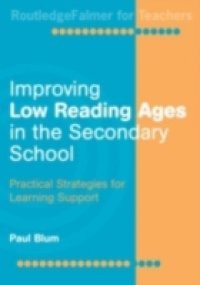This highly practical guide shows how learning support teachers and assistants can work effectively with secondary school pupils who are struggling with their reading. It relates directly to the working practices of teachers, steering them through issues such as: assessing the low-age reader working with reading withdrawal groups finding and creating resources for low-age readers constructing spelling strategies to support reading understanding the emotional dimension to being a poor reader how to effectively involve parents. Paul Blum offers valuable advice on how to make challenging mainstream subject textbooks accessible to low-aged readers and help on where to find good free resources as well as commercial materials to suit them. Exploring the vital relationship between the mainstream and learning support function, he also outlines the ways in which the two can be harnessed to make a significant difference to reading improvement.

